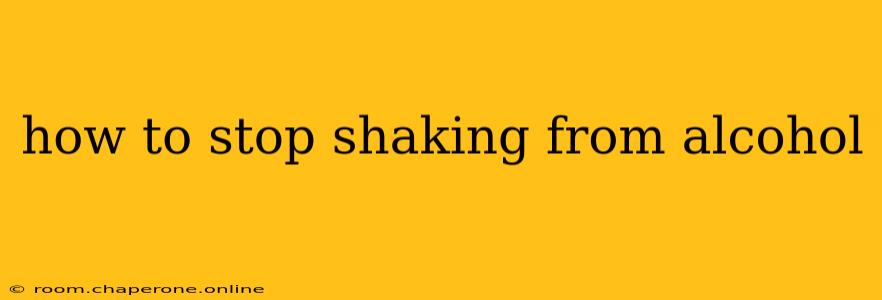Alcohol withdrawal can be a dangerous and uncomfortable experience, and shaking (tremors) is a common symptom. If you're experiencing significant shaking or other severe withdrawal symptoms, seek immediate medical attention. This is crucial, as untreated withdrawal can lead to serious health complications, including seizures and delirium tremens (DTs).
This article provides information for educational purposes only and should not be considered medical advice. Always consult a healthcare professional for diagnosis and treatment.
Understanding Alcohol Withdrawal and Tremors
Alcohol affects the central nervous system, and when someone who regularly drinks alcohol stops abruptly, the body goes through a period of adjustment. This is alcohol withdrawal. The severity of withdrawal symptoms depends on factors such as the amount and duration of alcohol consumption, overall health, and individual sensitivity.
Shaking or tremors are often one of the first symptoms to appear, usually within a few hours to a day after the last drink. Other common symptoms include:
- Anxiety and irritability: Feeling restless, on edge, and easily agitated.
- Sweating: Excessive perspiration.
- Nausea and vomiting: Digestive upset.
- Headaches: Persistent and throbbing pain.
- Insomnia: Difficulty sleeping.
- Increased heart rate and blood pressure: Elevated vital signs.
- Seizures: In severe cases.
- Hallucinations: Visual, auditory, or tactile.
- Delirium tremens (DTs): A severe and potentially life-threatening complication characterized by confusion, disorientation, hallucinations, and seizures.
What to Do if You're Shaking from Alcohol Withdrawal
The most important thing is to seek professional medical help immediately. Do not attempt to manage severe withdrawal symptoms on your own.
A doctor or other healthcare provider can:
- Assess your condition: Determine the severity of your withdrawal symptoms.
- Provide medication: Prescribe medications to manage withdrawal symptoms, such as benzodiazepines, which can help reduce anxiety, tremors, and seizures.
- Monitor your vital signs: Keep track of your heart rate, blood pressure, and other important indicators.
- Provide supportive care: Offer guidance and support to help you through the withdrawal process.
- Recommend further treatment: Discuss options for long-term alcohol treatment and recovery.
Self-Care Strategies (Only for Mild Symptoms – Seek Professional Help if Symptoms are Severe)
If you experience mild shaking, along with other relatively mild withdrawal symptoms, and you are under the care of a healthcare professional who has approved these steps, some self-care strategies may help alleviate discomfort, but they are not a replacement for medical attention:
- Hydration: Drink plenty of fluids, such as water, clear broths, and electrolyte drinks, to stay hydrated.
- Nutrition: Eat nutritious meals regularly to maintain energy levels.
- Rest: Get adequate sleep to aid recovery.
- Stress reduction techniques: Practice relaxation techniques such as deep breathing exercises or meditation.
It's crucial to understand that these self-care strategies are only helpful for mild symptoms and should never be used in place of professional medical care.
Long-Term Recovery from Alcohol Dependence
Successfully managing alcohol withdrawal is just the first step towards long-term recovery. If you're struggling with alcohol dependence, seeking professional help is vital. Treatment options include:
- Detoxification: A medically supervised process to safely withdraw from alcohol.
- Therapy: Individual or group therapy to address underlying issues contributing to alcohol abuse.
- Support groups: Connecting with others facing similar challenges.
- Medication: Medications to help manage cravings and prevent relapse.
Remember, recovery from alcohol dependence is possible, but it requires professional guidance and support. Don't hesitate to seek help if you need it. Your health and well-being are paramount.

